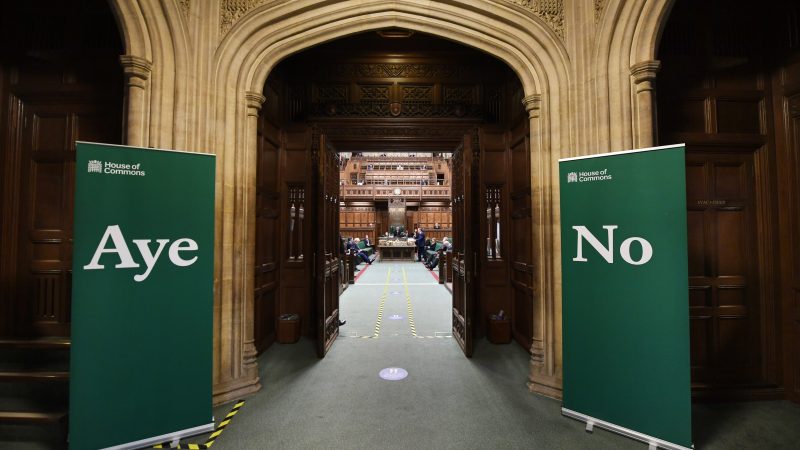
The government has voted down by a majority of 100 votes an amendment to the pension schemes bill that would have required schemes in the UK to develop strategies to comply with the Paris agreement on climate change by 2050.
256 MPs backed the change to the legislation tabled by the Labour Party this evening, which would have required alignment with the internationally agreed set of climate objectives within 30 years from now “or sooner”, while 356 voted against.
Labour’s Jonathan Reynolds told MPs: “Our colleagues in the Lords worked hard with the government to bring in requirements in the bill on the assessment and disclosure of climate risks in pension investments.
“This is a historic step. The first time it has ever been included in UK pensions legislation and we all should and do celebrate that fact. But we know that, with the climate emergency getting even more serious, it is possible to go even further.
“We are bringing forward an amendment today, which would allow regulators to mandate occupational schemes to develop a clear investment strategy that is aligned with net-zero greenhouse gas emissions at the pace the science demands.”
The Shadow Work and Pensions Secretary added: “This amendment is not just about where capital is allocated. It is about the stewardship that we need to see from all asset managers over the companies they have investments in.
“This is not a divestment amendment, nor does it limit the choices available to fund managers… It is simply about setting a strategy in place that considers their role in meeting out climate objectives.
“Furthermore, this proposal is designed to allow the government the flexibility to guide schemes via regulations; to ensure trustees have a strategic plan to become Paris aligned over a period of time.
“Any measures resulting from this amendment will be subject to extensive consultation with market participants so that their design can take into account what works best for schemes… This is written to be as accommodating as possible.”
The bill, which passed both the report stage and third reading in the Commons today, provides for a new form of scheme designed to be less expensive for the employer to run and fund known as a ‘collective money purchase scheme’.
The measures put forward by the government in the pensions legislation only make it mandatory for workplace schemes to manage the impact of climate change, and provide reporting on how they have done so, as a financial risk.
The opposition party has seen resistance from within the labour movement to its position on the bill. Critics have said the amendment represents a deviation from previous commitments to reach net-zero by 2030.
Labour for a Green New Deal spokesperson Lauren Townsend said: “Labour members are appalled to see our leadership abandoning the 2030 decarbonisation target mandated by the last party conference, and reaffirmed by Ed Miliband just months ago.”
Labour conference on 2019 approved a motion, backed by Unite and then Shadow Business, Energy and Industrial Strategy Secretary Rebecca Long-Bailey, committing to working “towards a path to net-zero carbon emissions by 2030”.
Current Shadow Secretary Ed Miliband spoke in favour of the 2030 emissions reduction target set out under the previous Labour leadership, saying in July this year that it was “completely right on the ambition we need over the next decade”.
Townsend added: “This is an unacceptable betrayal of party democracy. With only a decade left to prevent climate catastrophe, how can Labour call for urgent action in one breath, and ask for a 2050 net-zero target for pensions in the next?
“Finance is an important arena for climate action. But from abandoning proposals to delist companies failing climate tests, to delaying net-zero targets to 2050, Labour seems to be hoping the market can solve the very crisis it created.
“Commitment to a green new deal means taking on the corporate interests driving us over the climate cliff. Members won’t stand for anything less.”
Labour also proposed a change to the bill this evening that would have required the government to make sure pension scheme members receive an impartial guidance appointment before they become eligible to access their pension benefit.
Chair of the work and pensions committee and Labour MP Stephen Timms argued: “Implementation of the ‘pensions freedoms’ without the intended safeguards has caused a great deal of harm. We must now put those safeguards in place.”
Pensions freedoms introduced by the government in 2015 allow people over the age of 55 to access their ‘defined contribution’ or ‘money purchase’ pension pot, enabling them to withdraw their whole pension in one lump sum.
Timms’ committee has warned on several occasions since the change in the law that the government needs to protect people targeted by cold-calling scammers. An estimated £30.9m has been lost to fraudsters since 2017, according to Action Fraud.
The amendment, which would have required the government to write to members or survivors of a scheme five years prior to the age of becoming eligible to access their benefits to offer an appointment, was voted down by a majority of 89 votes.




More from LabourList
‘Labour won’t stop the far right by changing leaders — only by proving what the left can deliver’
‘Cutting Welsh university funding would be economic vandalism, not reform’
Sadiq Khan signals he will stand for a fourth term as London Mayor